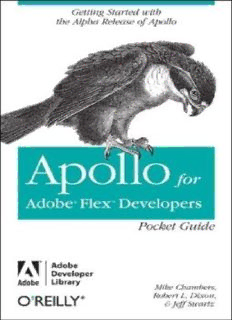
Apollo for Adobe Flex Developers Pocket Guide PDF
Preview Apollo for Adobe Flex Developers Pocket Guide
Apollo for Adobe Flex Developers Pocket Guide Table of Contents Copyright Preface Chapter 1. Introduction to Apollo Section 1.1. A Short History of Web Applications Section 1.2. Problems with Delivering Applications via the Browser Section 1.3. Introducing the Apollo Runtime Section 1.4. Primary Apollo Technologies Chapter 2. Getting Started with Apollo Development Section 2.1. Installing the Apollo Alpha 1 Runtime Section 2.2. What You Need in Order to Develop Apollo Applications Section 2.3. Building a Sample Apollo Application Section 2.4. Next Steps Chapter 3. Using HTML Within Flex-Based Apollo Applications Section 3.1. HTML Support in Apollo Section 3.2. Using the Flex HTML Component Section 3.3. Using the HTMLControl Class Section 3.4. Script Bridging: Communicating Between ActionScript and JavaScript Chapter 4. Using the File System API Section 4.1. Security Model Section 4.2. Accessing Files and Directories Section 4.3. Asynchronous and Synchronous Versions of Methods Section 4.4. Reading Directory Contents Section 4.5. Getting File Information Section 4.6. Copying and Moving Files and Directories Section 4.7. Creating Files and Directories Section 4.8. Deleting Files and Directories Section 4.9. Reading and Writing Files Chapter 5. Apollo Mini-Cookbook Section 5.1. Working with the File System Section 5.2. Working with HTML Section 5.3. Using the Windowing API Appendix A. Apollo Packages and Classes Appendix B. Apollo Command-Line Tools Section B.1. AMXMLC Section B.2. ADL Section B.3. ADT Index SYMBOL A B C D E F H I J K L M N O P R S T U V W X Apollo for Adobe Flex Developers Pocket Guide By Mike Chambers, Rob Dixon, Jeff Swartz ............................................... Publisher: O'Reilly Pub Date: March 31, 2007 Print ISBN-10: 0-596-51391-7 Print ISBN-13: 978-0-59651391-7 Pages: 144 Table of Contents | Index Written by members of the Apollo product team, this is the official guide to the Alpha release of Adobe's Apollo project, the revolutionary cross platform desktop runtime from Adobe Labs. Adobe Apollo Pocket Guide for Flex explains how to build and deploy Flash-based Rich Internet Applications (RIAs) to the desktop using Adobe's Flex framework. This book describes concisely how Apollo works, and offers numerous examples for those who want to start building RIAs for the desktop right away. Why put RIAs on the desktop? They're already supposed to offer the responsiveness of desktop programs. Unfortunately, web browsers can't support all of the interactions we expect from applications. You can't drag a file into an RIA and have it act on that file, for example, or have RIAs interact with other applications on the computer. Adobe's Apollo project gives you the best of both worlds -- the RIA development model and true desktop functionality. This pocket guide explains how. Topics include: The types of applications Apollo targets: Steps for creating your first application Using the File I/O API Using HTML within Flex-based Apollo Applications Apollo Mini Cookbook for common tasks Apollo Packages and Classes, and Command-Line Tools Once you understand the basics of building a Flex-based Apollo application, this pocket guide makes an ideal reference for tackling specific problems. Apollo for Adobe Flex Developers Pocket Guide By Mike Chambers, Rob Dixon, Jeff Swartz ............................................... Publisher: O'Reilly Pub Date: March 31, 2007 Print ISBN-10: 0-596-51391-7 Print ISBN-13: 978-0-59651391-7 Pages: 144 Table of Contents | Index Copyright Preface Chapter 1. Introduction to Apollo Section 1.1. A Short History of Web Applications Section 1.2. Problems with Delivering Applications via the Browser Section 1.3. Introducing the Apollo Runtime Section 1.4. Primary Apollo Technologies Chapter 2. Getting Started with Apollo Development Section 2.1. Installing the Apollo Alpha 1 Runtime Section 2.2. What You Need in Order to Develop Apollo Applications Section 2.3. Building a Sample Apollo Application Section 2.4. Next Steps Chapter 3. Using HTML Within Flex-Based Apollo Applications Section 3.1. HTML Support in Apollo Section 3.2. Using the Flex HTML Component Section 3.3. Using the HTMLControl Class Section 3.4. Script Bridging: Communicating Between ActionScript and JavaScript Chapter 4. Using the File System API Section 4.1. Security Model Section 4.2. Accessing Files and Directories Section 4.3. Asynchronous and Synchronous Versions of Methods Section 4.4. Reading Directory Contents Section 4.5. Getting File Information Section 4.6. Copying and Moving Files and Directories Section 4.7. Creating Files and Directories Section 4.8. Deleting Files and Directories Section 4.9. Reading and Writing Files Chapter 5. Apollo Mini-Cookbook Section 5.1. Working with the File System Section 5.2. Working with HTML Section 5.3. Using the Windowing API Appendix A. Apollo Packages and Classes Appendix B. Apollo Command-Line Tools Section B.1. AMXMLC Section B.2. ADL Section B.3. ADT Index Adobe Apollo® for Flex™: Pocket Guide by Mike Chambers, Robert L. Dixon, and Jeff Swartz Copyright © 2007 Adobe Systems, Inc. All rights reserved. Printed in the United States of America. Published by O'Reilly Media, Inc., 1005 Gravenstein Highway North, Sebastopol, CA 95472. O'Reilly books may be purchased for educational, business, or sales promotional use. Online editions are also available for most titles (safari.oreilly.com). For more information, contact our corporate/ institutional sales department: (800) 998-9938 or [email protected]. Editor:
Description: